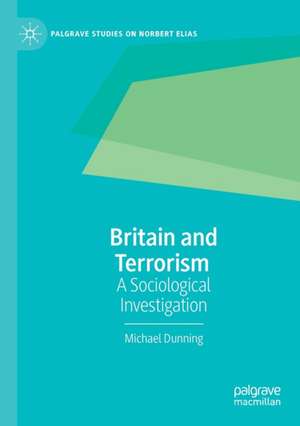Britain and Terrorism: A Sociological Investigation: Palgrave Studies on Norbert Elias
Autor Michael Dunningen Limba Engleză Paperback – 24 iun 2022
| Toate formatele și edițiile | Preț | Express |
|---|---|---|
| Paperback (1) | 696.68 lei 6-8 săpt. | |
| Springer International Publishing – 24 iun 2022 | 696.68 lei 6-8 săpt. | |
| Hardback (1) | 702.05 lei 6-8 săpt. | |
| Springer International Publishing – 23 iun 2021 | 702.05 lei 6-8 săpt. |
Preț: 696.68 lei
Preț vechi: 819.62 lei
-15% Nou
Puncte Express: 1045
Preț estimativ în valută:
133.31€ • 145.26$ • 112.33£
133.31€ • 145.26$ • 112.33£
Carte tipărită la comandă
Livrare economică 23 aprilie-07 mai
Preluare comenzi: 021 569.72.76
Specificații
ISBN-13: 9783030723026
ISBN-10: 303072302X
Ilustrații: XI, 332 p.
Dimensiuni: 148 x 210 mm
Greutate: 0.41 kg
Ediția:1st ed. 2021
Editura: Springer International Publishing
Colecția Palgrave Macmillan
Seria Palgrave Studies on Norbert Elias
Locul publicării:Cham, Switzerland
ISBN-10: 303072302X
Ilustrații: XI, 332 p.
Dimensiuni: 148 x 210 mm
Greutate: 0.41 kg
Ediția:1st ed. 2021
Editura: Springer International Publishing
Colecția Palgrave Macmillan
Seria Palgrave Studies on Norbert Elias
Locul publicării:Cham, Switzerland
Cuprins
Introduction: Research on Terrorism as Part of the Terrorism Problem.-Section 1: The Sociogenesis of Terrorism in Nineteenth Century Britain.- Chapter 1: The Development of the Concept of Terrorism in Antithesis to the Concept of Civilisation.- Chapter 2: The Sociogenesis of Terrorism in Nineteenth Century Britain in Relation to Ireland.- Chapter 3: Trades Unions, Political Reformers, Revolutionary Europe and Terrorism.- Section 2: The Sociogenesis of Terrorism in Twentieth and Twenty-First Century Britain.- Chapter 4: The World Wars and the Cold War – Terrorism and Inter-State Violence.- Chapter 5: The Sociogenesis of Terrorism, the End of the British Empire, the Middle East and International Terrorism.- Chapter 6: The Fault-Lines in the British Monopoly of Violence and ‘Domestic’ Terrorism.- Section 3: Micro-Level Processes and Jihadist Terrorism in Britain..- Chapter 7: Case Study: the 7/7 Bombers..- Chapter 8: Case Study: British Jihadis in Syria and Iraq.- Conclusion.
Notă biografică
Michael Dunning is Lecturer in Sociology at the University of Leicester, UK. His primary research interests include the processes and relationships that contribute to the development of terrorism, ‘radicalisation’ and extremism.
Textul de pe ultima copertă
"By applying sociological insights, most notably influenced by the work of Norbert Elias, to the 250 year development of terrorism in the UK, Michael Dunning has produced an impressively insightful and innovative book. Britain and Terrorism is founded upon a refreshing breadth of expertise that brings to the forefront the social conditions both behind the designation of behaviour as terrorism and the acts that are undertaken by designated terrorists. Consequently this book should be essential reading for anyone who is keen to gain a thoroughly well informed and detached analysis of the concept of terrorism and associated actions.
—Stephen Vertigans, Robert Gordon University, Aberdeen, UK
"Dunning offers a long-term view of the changing perception, as well as the practice, of terrorism. It avoids especially the fallacy of trying to understand it through the psychology of the terrorist alone. The book invokes the spirit of Norbert Elias, and is a worthy contribution to that classic tradition."
—Stephen Mennell, Professor Emeritus of Sociology, University College Dublin.
—Stephen Vertigans, Robert Gordon University, Aberdeen, UK
"Dunning offers a long-term view of the changing perception, as well as the practice, of terrorism. It avoids especially the fallacy of trying to understand it through the psychology of the terrorist alone. The book invokes the spirit of Norbert Elias, and is a worthy contribution to that classic tradition."
—Stephen Mennell, Professor Emeritus of Sociology, University College Dublin.
Challenging the standard paradigm of terrorism research through the use of Norbert Elias’s figurational sociology, Michael Dunning explores the development of terrorism in Britain over the past two centuries, focusing on long-term processes and shifting power dynamics. In so doing, he demonstrates that terrorism as a concept and designation is entwined with its antithesis, civilization. A range of process sociological concepts are deployed to tease out the sociogenesis of terrorism as part of Britain’s relationships with France, Ireland, Germany, the Soviet Union, the industrial working classes, its colonies, and, most recently, jihadism. In keeping with the figurational tradition, Dunning examines the relationships between broad, macro-level processes and processes at the level of individual psyches, showing that terrorism is not merely a ‘thing’ done to a group, but part of a complex web of interdependent relations.
Michael Dunning is Lecturer in Sociology at the University of Leicester, UK. His primary research interests include the processes and relationships that contribute to the development of terrorism, ‘radicalisation’ and extremism.
Caracteristici
Offers a major challenge to our understanding of terrorism and the processes by which terrorism comes about, thereby avoiding the definitional issues of 'mainstream' other research on the topic. A valuable contribution to figurational sociology, broadening the scope of process sociological research on terrorism. Provides a case study of the figurational approach as well as a theoretical examination of terrorism suitable for graduate course study on Elias, violence, criminology, terrorism and international relations







